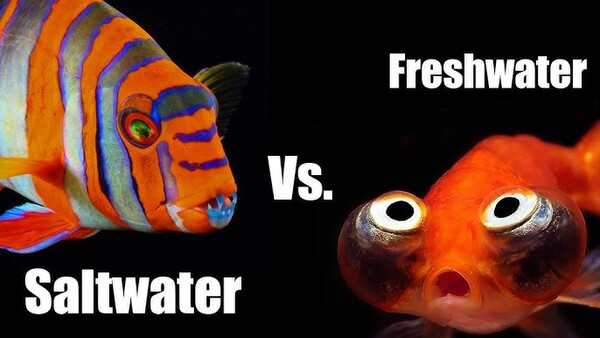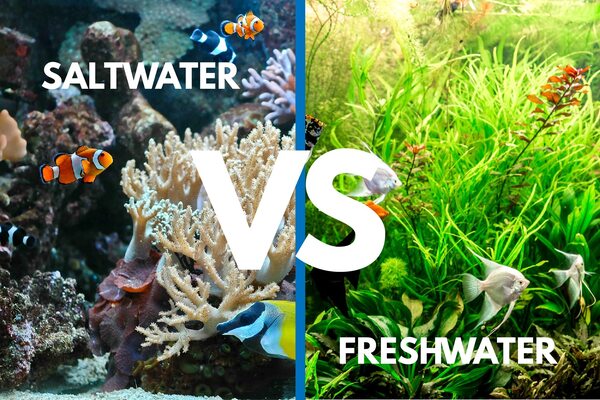Fish is widely celebrated as a nutritious protein source, but a common debate persists: is freshwater fish or saltwater fish healthier? This comprehensive guide delves into the differences between the two, comparing their health benefits, nutritional value, and risks, including the impact of Japan's recent nuclear wastewater discharge on saltwater fish.

Freshwater fish, sourced from rivers, lakes, and ponds, offers a variety of benefits:
Low Mercury Levels: Freshwater fish generally contain lower mercury levels compared to their saltwater counterparts. This makes them a safer option for pregnant women and children.
Rich in Protein: Freshwater species like tilapia and catfish are lean sources of protein, essential for muscle growth and repair.
Affordable and Accessible: Freshwater fish are often more affordable, making them a practical choice for everyday meals.
Low Sodium Content: With a naturally lower sodium content, freshwater fish is a heart-healthy option.
Vitamin and Mineral Profile: Freshwater fish provide key nutrients, including B vitamins, phosphorus, and selenium, which support energy metabolism and immune health.
Saltwater fish, thriving in oceans and seas, are packed with essential nutrients:
Rich in Omega-3 Fatty Acids: Species like salmon, mackerel, and tuna are loaded with omega-3s, known for improving heart health, reducing inflammation, and boosting brain function.
High Vitamin D Content: Saltwater fish are one of the best natural sources of vitamin D, crucial for bone health and immunity.
Mineral-Rich Diet: The saline environment of the ocean enriches these fish with iodine and magnesium, essential for thyroid function and muscle health.
Diverse Culinary Options: The robust flavor and firm texture of saltwater fish make them versatile for grilling, baking, and steaming.

| Nutrient | Freshwater Fish | Saltwater Fish |
|---|---|---|
| Omega-3 Fatty Acids | Lower amounts (e.g., tilapia) | Higher amounts (e.g., salmon, mackerel) |
| Protein | Moderate levels | High levels |
| Mercury Levels | Generally lower | Potentially higher in large predators |
| Minerals | Rich in phosphorus and selenium | Rich in iodine and magnesium |
| Sodium Content | Lower | Higher |
| Flavor | Mild and delicate | Robust and distinctive |
Freshwater Fish: Known for their mild and subtle flavor, freshwater fish like bass and trout are excellent for delicate dishes like poached or lightly seasoned recipes.
Saltwater Fish: Saltwater species often boast a bold, savory taste with a firmer texture, perfect for grilling or roasting. Popular choices include cod, tuna, and snapper.
In 2023, Japan began releasing treated nuclear wastewater from the Fukushima plant into the Pacific Ocean. While officials claim the water meets safety standards, concerns linger:
Radioactive Contamination: Trace amounts of radioactive isotopes, such as tritium, may accumulate in marine life, raising potential health risks.
Bioaccumulation: Large saltwater fish higher in the food chain, such as tuna and swordfish, are more likely to concentrate these isotopes, increasing risks for consumers.
Public Perception: Fear of contamination has reduced global demand for Pacific seafood, affecting fishing industries.
Precautionary Advice: Consumers should opt for smaller saltwater species or fish from regions unaffected by nuclear discharge to minimize risks.
Freshwater Fish: Overfishing and habitat loss threaten some species. However, aquaculture practices can sustainably meet demand.
Saltwater Fish: Wild-caught saltwater fish may face overexploitation. Sustainable choices include certified fish (e.g., MSC-certified).
The answer depends on individual needs:
For Omega-3s: Saltwater fish reign supreme.
For Lower Contaminants: Freshwater fish are safer in regions with clean water sources.
For Environmental Impact: Choose sustainably farmed or caught fish.
Both freshwater and saltwater fish have unique advantages. Freshwater fish offer affordability, accessibility, and lower contaminant risks, while saltwater fish excel in omega-3 content and robust flavors. As environmental concerns like Japan’s nuclear wastewater discharge grow, consumers should prioritize informed choices, ensuring safety and sustainability while enjoying the health benefits of fish.
animal tags: Both-freshwater saltwater-fish
We created this article in conjunction with AI technology, then made sure it was fact-checked and edited by a Animals Top editor.